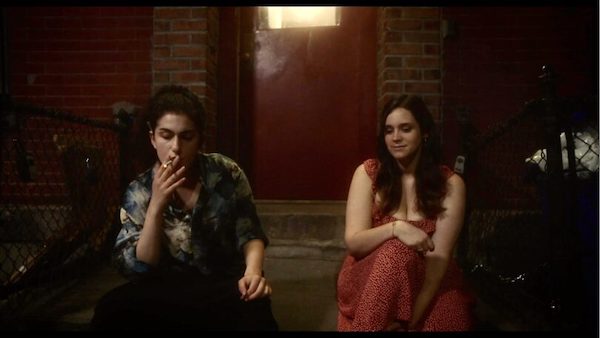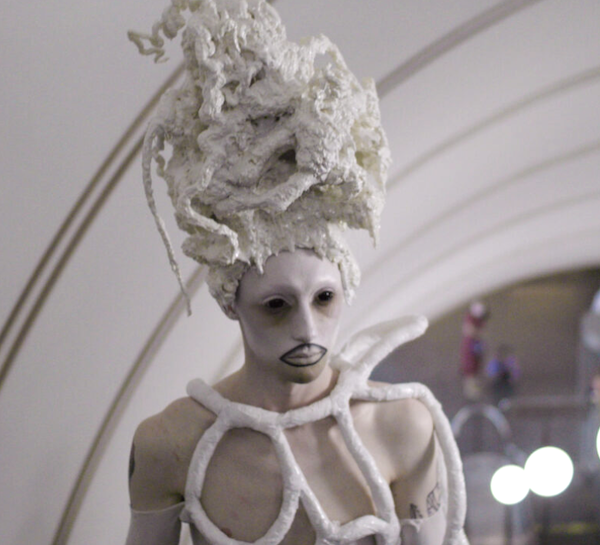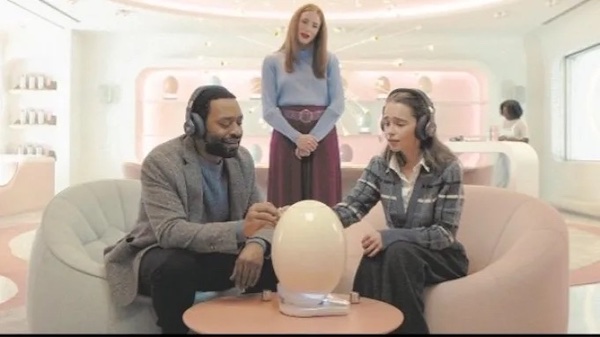Film Festival Review: More Reviews from Provincetown 2023
By Tim Jackson
Five reviews of the kind of films that the Provincetown Film Festival celebrates. Their stories speak to our shared humanity.
At this year’s 25th Provincetown Film Festival, I looked for features without theatrical distribution. Four out of five were small and independent, the kind of films that the festival celebrates and whose stories speak to our shared humanity. They were accompanied by directors, actors, or crew who relished festival exposure and Provincetown’s friendly ambiance.

A scene from Hangdog.
Hangdog, produced by a group of independent artists loosely based on the experiences and relationships of the film’s creators, was directed by Matt Cascella and written and co-produced with his wife, Jennifer Cordery. It was shot in and around Portland, Maine with New York actors in the two leads. Walt, played by Desmin Borges (You’re the Worst), who looks much like director Cascella, finds it hard to commit to his girlfriend Wendy, who has proposed marriage. Wendy, played by Kelly O’Sullivan (Saint Francis), heads off to deliver a pitch for a high-stakes job interview, leaving her dog in Walt’s care. Anxious and unemployed, Walt stumbles into a marijuana dispensary for a ‘pre-roll’ hoping to reduce his anxiety. He leashes the dog to a pole and, during his brief absence, the dog is stolen. Walt prints posters and offers a $500 reward for the animal’s return, which he quickly doubles to $1000.
Walt is somewhat of a hangdog himself and knows that if he loses the canine he may lose the girlfriend. She checks in about her beloved pooch and Walt awkwardly conceals the truth. He grows increasingly desperate until a teenager on Peaks Island, a small town off the Maine coast, claims to have the dog. Walt travels to the area but the kid runs away with the reward money — without returning the dog. The hunt for the thief in this island community, where everybody knows everybody else, becomes the comic center of the film. The chemistry among the performers and crew was obvious in their talkback session. The camaraderie is evident on screen. The supporting cast members from Maine are particularly adept: they catch the eccentricities of the island populace while avoiding the trap of using Maine accents for humor. The funky ambience of Portland and rural Maine make Hangdog a charmer.

A scene from August at Twenty-Two.
August at Twenty-Two, directed by Sophia Castuera, is another collaboration among friends. Ali Edwards stars in her script, which is loosely based on her experiences as a young actress. She plays Cal Davidson, a recent college graduate who is now living in New York, juggling friendships and acting auditions. Castuera and Edwards are both performers and directors; they attended Boston University together. With producer Mary Elizabeth Monda, they created the feminist film company, Lady Parts Productions. That rapport supplies the film with a loose ambiance, reminiscent of the Mumblecorps efforts of the early 2000s, which emphasized relationships over plot and often built stories through improvisation. While August at Twenty-Two is scripted, its naturalistic atmosphere is well suited for its story, which takes place in small apartments and at parties. Cal seduces and is seduced at parties. She struggles at auditions. The camera work is close and intimate. Edwards’ lovely performance catches the confusion, insecurities, and shifting alliances of life among young artists navigating life in the Big Apple. The story is quite moving, particularly in the striking last shot that subtly infers that the person you must rely on is yourself.
Big Boys by director Corey Sherman is a coming-of-age story about a boy who develops a gay crush on his cousin’s boyfriend. Jamie, an overweight 14-year-old (Isaac Krasner), goes on a camping trip with his cousin Allie (Dora Madison) and older brother Will (Taj Cross). Allie brings along her boyfriend, Dan (David Johnson III). Jamie is impressed by Dan’s masculinity and awkwardly tries to impress him with his cooking skills. Will brings his younger brother to a nearby campsite to seduce two girls, but Jamie is uncooperative. He feigns being drunk, later lying to his brother that he did, in fact, ‘score.’ Krasner is an effortlessly charismatic actor, deftly alternating between self-consciousness and the telltale boasting of an awkward 14-year-old. Big Boys deals with the conflicts of adolescent gay identity with remarkable insight, building to a moving and gentle climax. It is a sweet and empowering film that deserves wider recognition.

A scene from Queendom
Queendom is the profile of non-binary Russian activist/artist Gena Marvin. The handcrafted costumes and make-up are breathtaking and are given beautiful cinematic treatment. Gena takes their performances to the streets of Moscow, which supplies plenty of surreal moments, especially when they appear on crowded Russian streets and spaces. This bold statement of individuality puts Gena under the constant scrutiny of Russian authorities, but their artistry and courage never waver despite, as a Russian friend explains: “We have fear and subservience in our DNA.”
When the war in Ukraine begins, threats to their freedom grow more palpable. I spoke with director and co-producer Agniia Galdanova, who took four years to make the film. Inspired by “the resilience and beauty of the drag queen community” she stuck with a production that was as complex and risky as one could imagine. She still has family members in Russia. Everyone involved in Queendom saw it as a project that extols a commitment to individual freedom. The documentary also provides glimpses of stunning performance art. Galdanova is hoping for a distributor. I cannot imagine she won’t find one.

A scene from The Pod Generation.
The Pod Generation is a relationship movie of quite a different sort and with a much higher budget. The film was the Alfred P. Sloan Feature Film Prize winner at Sundance and has been acquired by Roadside Attractions and Vertical Entertainment. Emilia Clarke and Chiwetel Ejiofor play a couple considering having a child. Rachel, who works for a creepily intrusive technology company, has been offered a promotion. But pregnancy would be a significant inconvenience. So, in this fantastical but gleaming future vision, women have been given the means to avoid natural childbirth — they can raise their fetuses in a pod. When Rachel is accepted by the Womb Center, which offers portable artificial wombs, she takes up the offer. Alvy, a botanist, is appalled. In their apartment arboretum he teaches students about the joys of the natural world, such as how to pick and taste a wild fig. It is a blatant setup for a stereotypical conflict, but Clarke and Ejiofor manage to add soul to this broad satire.
The couple’s apartment has various devices that can prepare coffee and toast in the morning, measure people’s bliss, and much more. A ubiquitous Siri/Alexa type device attends to their every need and question. The Pod Generation‘s critique of our growing separation from nature and from one another because of evolving technology strikes home. There are some absurd exaggerations, such as “accessory patches” in the Pod that allow the infant to form dreams. How the child will be birthed becomes a narrative problem the film wraps up all too quickly. Nevertheless, the performances and futuristic set design, along with questions it raises about what life will be like in our brave new world, make this a satisfying romp.
Tim Jackson was an assistant professor of Digital Film and Video for 20 years. His music career in Boston began in the 1970s and includes some 20 groups, recordings, national and international tours, and contributions to film soundtracks. He studied theater and English as an undergraduate, and has also worked helter skelter as an actor and member of SAG and AFTRA since the 1980s. He has directed three feature documentaries: Chaos and Order: Making American Theater about the American Repertory Theater; Radical Jesters, which profiles the practices of 11 interventionist artists and agit-prop performance groups; When Things Go Wrong: The Robin Lane Story. And two short films: Joan Walsh Anglund: Life in Story and Poem and The American Gurner. He is a member of the Boston Society of Film Critics. You can read more of his work on his blog.
Tagged: 25th Provincetown Film Festival, August at Twenty-Two, Big Boys, Gena Marvin, Hangdog, Matt Cascella, Queendom, Sophia Castuera
